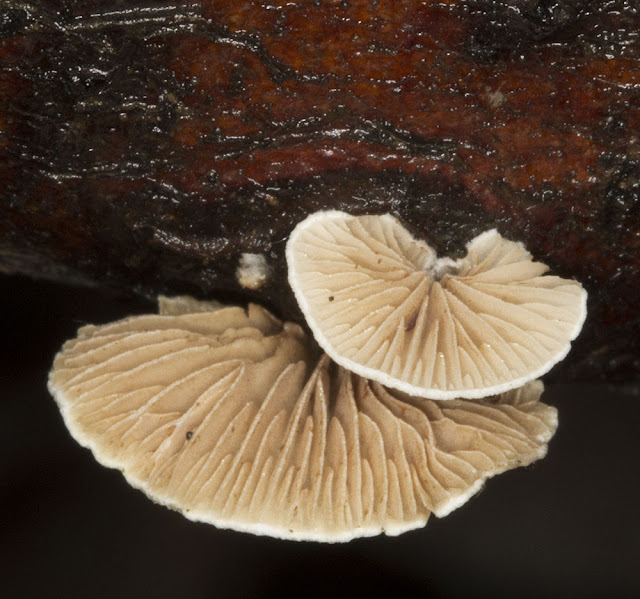 |
| Orpington Field Club walking down into the valley from below Ashmore Farm. Leaves Green, 3 December 2011. |
Another outing for the Orpington Field Club! This time we were led on a walk from Leaves Green, across one of Bromley's dry chalk valleys. We walked down a lane with banks of clay soil, up and down grassy chalk slopes, and through woods.
Two of us also go to Sue Buckingham's weekly wildflower classes, so we were taking the opportunity to look for plants actually in flower. We found more than 30 different species, mostly single plants flowering out of season. I will write more about this later.
But we also saw the sort of thing you would expect to find at the beginning of winter.
 |
| Fruiting heads of Hogweed, Heraclium sphondylium, behind the car park in Leaves Green, 3 December 2011. |
This is what Hogweed looks like in December. In summer, the white flower heads attract hordes of beetles and flies. The fields in the valley were full of this sort of thing; dried heads of Wild Carrot, Yarrow, Ribwort Plantain and some others that we failed to identify. But the grass was green below them, and full of the young leaves of other plants that should grow to maturity next year.
Ferns do not flower, of course; they reproduce with spores. In the lane we passed a large and healthy Hart's-tongue Fern. They like it dark and damp.
 |
| Undersurface of a frond of Hart's-tongue Fern, Asplenium scolopendrium. Leaves Green, 3 December 2011. |
On the second half of our walk, on a path through a wood, we saw quite a few fungi. The woods were suitably dark and damp; we have had plenty of light rain, the days are short, and the sunlight is weak.
 |
| Fungus, Crepidotus species, probably mollis, growing on a fallen branch. Near Leaves Green, 3 December 2011. |
This is the underside of one that was growing on a piece of rotten wood. It was quite soft and flexible.
 |
| Fungus, Candlesnuff, Xylaria hypoxylon, near Leaves Green, 3 December 2011. |
Candlesnuff, sometimes called the Stag's-horn fungus, is common in the woods round here, and it, too, grows on rotting wood. We saw a lot of it on our recent
morning at Blackbush Shaw, but none of my photos of it from that day came out right. High contrast subjects taken with a flash are tricky! These shoots are only an inch or two long.
 |
| Fungus, Marasmius epiphyllus, growing on a dead beech leaf, near Leaves Green, 3 December 2011. |
These tiny fragile umbrellas were growing on a single fallen beech leaf, helping it to rot back down into the earth.
I will finish this post with one of the flowers we found, a delicate pink bud of the wild dog rose. An unexpected sight, completely out of season. But there is more to tell about this trip; it will be in the next post.
 |
| Bud of Dog-rose, Rosa canina, near Leaves Green, 3 December 2011. |







I can't recall a nicer lot of Walk photographs!
ReplyDelete